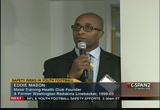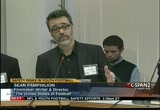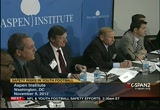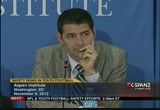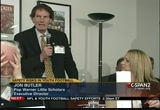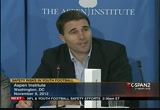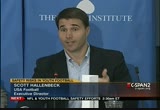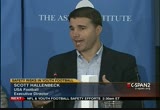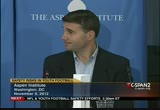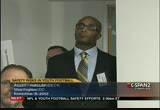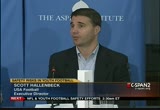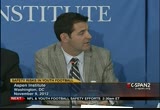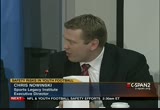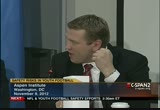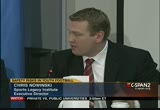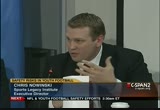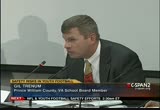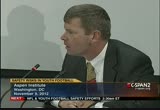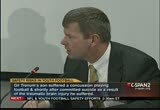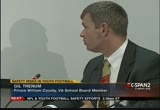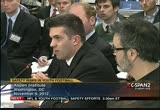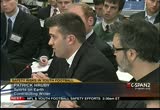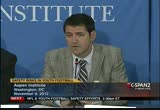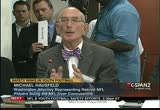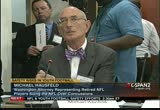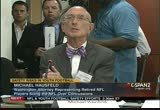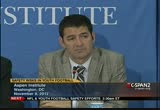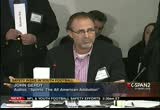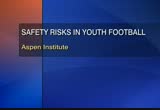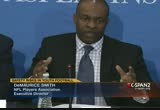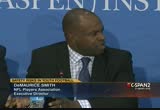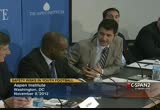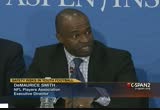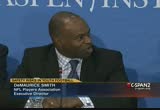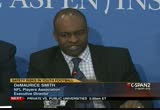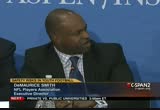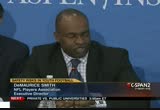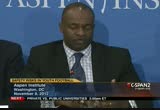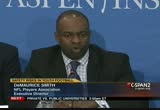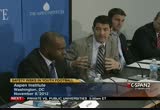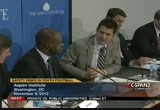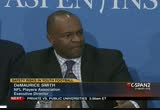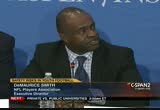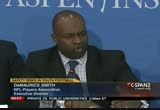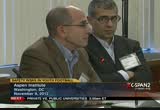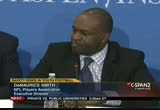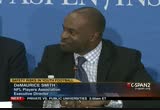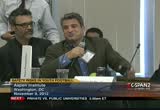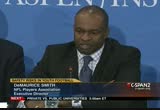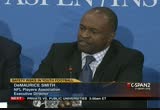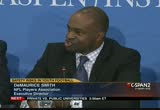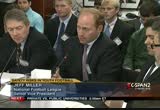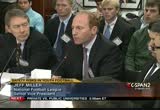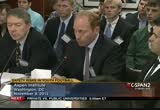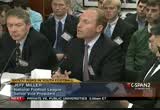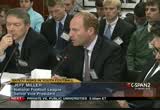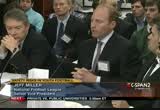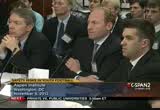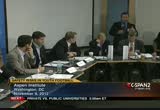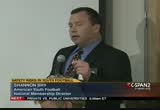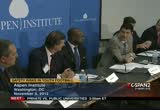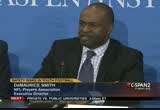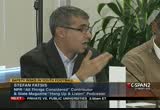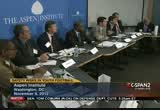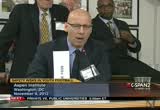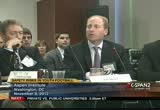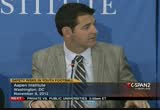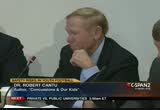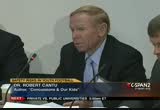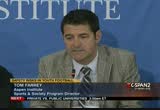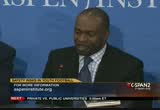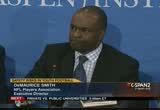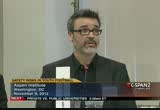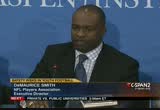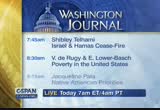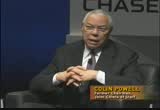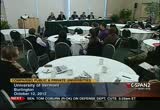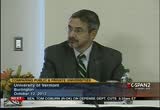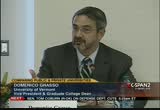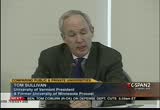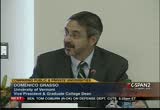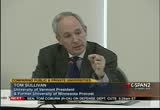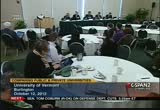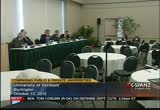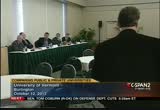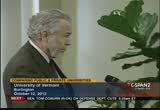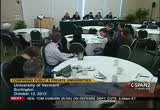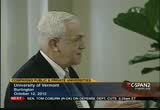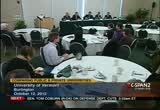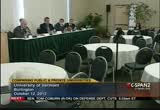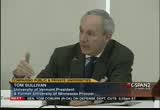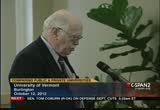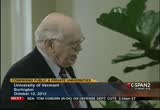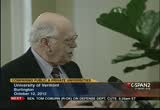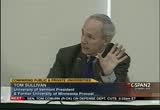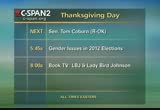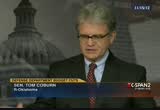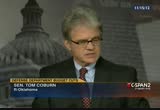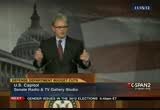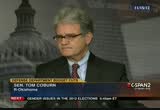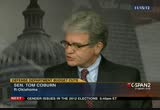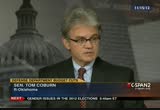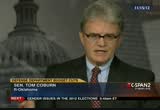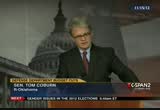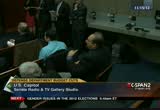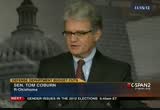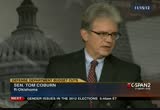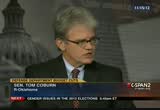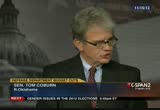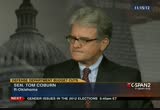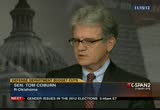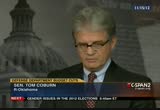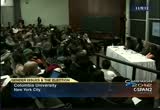tv Today in Washington CSPAN November 22, 2012 2:00am-6:00am EST
2:00 am
some of the coaches that talk about us how to tackle properly. that will help improve some of the safety of the game and keep kids from using their heads. >> got you. sean, documentary film maker, you're making a documentary now on football; right? i don't know too much about it. it has to do with the central question should you let your kid play. what have have you decided and learns? >> i'm working on a film serious. i shot about 30 hours of footage and i had the opportunity to work with ray about a year ago in virginia tech, and to eddie's point about the coaching, there was a pregame before, you know, there was not a single ref of offense or defense. it was all just loining the kids up and having them tag each other. there was, you know, in my experience, watching and playing football when i was younger. somebody is trying to elude somebody. it was literally bam, bam. and when the kid didn't rise up to the level of achievement the
2:01 am
coach wanted. it's pitiful. it's not dancing. the back of the jersey are reading animal and eliminator. my question is who is watching the people? my son is now 14, i interviewed dr. can ton a couple of years ago, to decide whether or not i wanted to let my son play. and i went the junior high school, and they have no guidelinings. they just canceled the program this year. but there was no coaching guidelines. there was a kid out there coaching defense and he's literally every other minute telling the kids to light them up. put them on the ass. that was all of it. there was no technique involved whatsoever. who is watching these people? that's what i want to know. there needs to be another layer. i agree with that. >> uh-uh. john walsh? >> we've heard a couple of assessments here on the kids as early as age 5 says they want to imulate their heroes they see on
2:02 am
saturday and sunday, we heard figures as high as 95% drop out if tackle football were eliminated from the youth. where is this research? and how they are row is the research about the parents fulling kids out of programs? >> tom would be best to answer that. >> actually, there's i think john might have a better sense. with regard to parents taking kids out of programs, we don't have as much on that. quite honestly. that is not well developed in the area of the motivation around leaving. what we do know about the motivation of leaving sports sports in general we know about that. it's not fun. and the pressure and all the other things we sort of in the youth sport community have talked about for years. it gets past what the original goal was. with regard to some of the questions that come up, if the child thinks it's not fun, whether you want to say flag is better or not, that's going to be a challenge.
2:03 am
if the sensibility of the child is they want to have fun playing the sport, we want to promote that. obviously safety first even more than fun. we know that the number one motivation for leaving youth sports, it langs a fun -- lacks a fun component. ashley? >> this is for scott and john. what possible benefit is there for a 6-year-old to be playing tackle football? >> [inaudible] i don't know that benefits. i can tell you they have fun doing it. when we started our youngest division, which is right at that age, i thought it was kind of a random -- regional project. it has grown like crazy. you don't see a lot of track
2:04 am
ling in the strictest sense. not that they're not being taught. the kids that the age tend to run in to each other and fall down or do a lot of shirt tackling. you know, grab the shirt. the primary goal to safe and the second goal it to keep it fun. i can tell you most of the kids i talk odd who played flag they say it was fun for a year or two years. when do i get the pads or helmet. that's part of the education process. if we are going change this, if research kinds we need to make the change. we need a lot of education. >> ashley talks about the nfl reporter for espn has written about -- i don't want to misquote you. you don't want your son to play football. >> right. he's 3 at this point. [laughter] >> there's a league out there for him.
2:05 am
>> there's plenty of things that kids want to do that are fun. but, i mean, isn't there a point where as parents as the adults so you to protect them from themselves? if you listen to dr. can too what he says, i mean, think any parent would be nuts to allow their kids to play tackle football period but certainly before the age of 14. >> i think you touched on something important. it's the decision of the parents. and one of the things i stressed i didn't recall on is i think all of us is a responsibility to make sure we educate the parents. there's a lot of information we adopt have yet. one of the things we're trying to do. we don't run legs. first time we teach tackles at 7 years old. not a big difference. for what it's worth. not based on some scientific evidence-based profile or something. i wish i had that. it's not nothing. we recommend the first experience be flag, and we don't run leagues.
2:06 am
we work with the groups make a better experience. the fact as john said is, parents make the decision and what we feel strongly about we need to do the best job question. i mean, we collectively. we need the medical expertise to help provide accurate and again, ideally speaking evidence-based information to parents so they can make the decision. they make the decisions all the time. they make it -- you make a decision all the time. when coi let my child ride a bike. when do you let them cross the road and walk to school. there's all kinds of safety decisions parents make all the time. you acknowledge -- you made a subjective decision i'm not going allow my child to play tackle football ever. or flag who knows. the other thing i think is important eddie touched on. the idea of proper tackling and teaching the ascending blow and holding the coaches accountable. they are not -- i hated to say
2:07 am
it, this is our fundamental challenge, is getting with the leagues and working more closely together and creating standard to ensure that coach cannot walk on the field until they from properly certified. that doesn't geern tie they are going teach it properly. it goes back the -- right there monitoring making sure before he steps on the field knows how to fit equipment. it's frightening to realize that high school coaches and youth coaches do not know how to properly fit equipment. it's a huge step in the right descricts if we can solve that. how do you teach tackles. going back frankly to lack of the better word, the ascending below. . it's not a launching below. learning from you the idea we run one of the largest flag programs in the country. it we think about and we have coaching education in flag concussion manment education. we if we teach them as you probablily transition these are
2:08 am
the kids of techniques you should be adopting that help grab a flag or make a tackle. that's a great lesson learning from the great experience. those are the kids of things we have to do together because the 40 states plus d.c. that has a concussion law. we had a conversation with the state senator in indiana talking about how do we push that down again to the middle school level and ultimately to the youth level? obvious they tell you you have to an organization that can governor and control the youth sports. most you can't because they are independent organizations. we're coming up with maybe the field. the fields are the place they can control. and if we work together and say coach has to be certified. you cannot walk on a puck little school -- walk on a it's a positive step in the right distribution. trying to address the complex problem. >> i worked on the story involving a 13-year-old kid out
2:09 am
of l.a. who was paralyzed because he stuck his head down. and, you know, one coach was trained but he wasn't teaching the way that bob warner taught him to teach. the assistant coach wasn't trained at all and believed he was teaching the right technique. >> he said in that spot i teach what i was caught. it goes back to eddie's point. we have to break the cycle. >> even if we were teaching the technique. that type of play, you know, there were coming at the angle to each other. it's trying to stop them at the goal line. it wouldn't have stopped. it wouldn't have prevented the injury was his -- his point was look, can you teach safe tackling. is it a little bit by ever -- at the end of the day you can train coaches. are you going get the point where it is safe for kids? >> so again, our view is -- we talk now to many, many coaches
2:10 am
and experts across the country. i mean, nfl, college, high school, you name it. and the two critical pieces and interesting to get eddie's perspective is the idea of heads up. literally the keeping the head up. in the case there's debate whether he was taught to keep the head forward. and coach will tell you, i've teaching it heads up tackling. then terminology. it is where the whole thing breaks down. because the next statement is bite the ball. lead with the screws. put the screws on the number. logic of that. have the ball right here and you're biting the ball. you are leading with your head. so two things we have to change, maybe three, proper education, teaching proper heads up whatever possible. this game is the bang bang the sort of the happened so quick.
2:11 am
you're not going to be at the the avoid a potential helmet to helmet contact entirely. there's no way. i do believe we can make dramatic improvement if we teach proper head up and have terminology that completely reinforce it is. no coach can say, as you said, lay hat on. that terminology has to be wiped out of football period. we need everybody. we need the priest of parents. i have great confidence if i can talk to every single football and explain in the kinds of things we're doing with the head up football program that at least if nothing else would give them greater confidence make a better educate decision, and over time we're going to see an improvement in proper tackle. >> i would like to move to the high school equation. we are ten minutes past the point where we should have. high school football is entrenched in the society. you know, i can actually see us moving to a flag model at the very youngest ages.
2:12 am
when you're talking about high school football. this is community entertainment. friday night lights. people gather around. yet we have high injury rates in high school. we have a lot of schools that don't have athletic trainers on site. we can -- we have experts to talk about that. kristin, why don't you tell us your credential and what your thought is on what we do with -- are there reforms that can be introduced at the high school level to make it safer so we don't have as many kids being injured? >> thank you, tom. chris, executive directer of the legacy. and codirect earth of the center for traumatic at boston university. high school is an interesting question. it's where i started playing football. and it's hard to figure where on the spectrum it fits. we know youth is probably more
2:13 am
dangerous than high school. we know that high school is a big part of our culture. i kind of want to go back, i have a lots of notes here to separate youth from kind of professional and then kind of where we're in the middle. because i think this discussion is really what is unique about football versus other sports and while we're having the discussion. a lot comes down to the adult game is not really separated from the youth game. in a meaningful way. like soccer there's no heading before a search age. no checking in ice hockey. baseball no curve ball. we don't do that football. it's the real game where head contact is not rare, and accidental. and so i think we have to kind of identify that as a big issue. but i think we have to look to in terms what we should be doing we actually can look up to the nfl and the nfl pa about steps
2:14 am
they have made in the last two years to make the game safer. you look at things like dramatically minimizing the hitting at practice. the one place they had a voice, they asked for it. agot it. the medical infrastructure is incredible. the baseline testing. the athletic trainer in the sky box to watch the feed. we know we can miss the concussion on the field. you look at the session that's what grown men demand. if you look at the way it should be done whether or not that's the way you believe. if that's the model, it's hard to justify exposing kids of any age under 18 on a philosophical level to the same sport without any of these infrastructure and resources. no limit on any level on practice exposure. which is terrible. there's no -- there's also no leadership from the high school
2:15 am
community to implement that in any way simple way. medical infrastructure 42% of the high school have athletic trainers. a study coming out saying girl soccers are you are eight times more likely to identify concussion in girls socker. we are certain we are not going to spot concussion at the high school level even with medical people. without medical folks and the younger you go, it's the wild west. if you catch one, in awhile, you think about how we train athletes, we train -- we're begging the nfl players and college to offer their -- report them. there's no real education program for children. nobody believes we can train children to report the symptom. they don't understand concussion. you separate the two things and you realize that, you know, we are refusing to give children the things we think grown men
2:16 am
deserve. and if you look at it from that perspective, the tackle football question especially when you get the youngest ages does seem out of place. that we allow that to happen. and this, this isn't a referendum on u.s.a. football on warner. the leading on this in terms of reforms. and i think that's fabulous but the reality is the big lack of control over can you force youth football programs to do the things we know is a good idea. the answer we just said is no. we can't. with the unknown and issues, we have to take a serious look. >> yeah i want to bring in michael. he's a lawyer, you can talk about the liability questions here as we develop knowledge. first i'm going go to gill. a school board member locally. also father, was a father of the football player.
2:17 am
tell us about the implications on schools as we learn more about this problem. >> okay. thank you, tom. my name is gill. i'm a school board member here in the northern virginia area. also --there's several things components to it. first is education. the parents that are out there are still don't know about this issue by and large. and it goes all the way down to the youth sports league. my kids have played multiple
2:18 am
sports. they played them all. we have been a big sports family with our boys. but with for the education component, there's still a ton that needs to be done at the beginning of last year, virginia is one of the states that has new mandating concussion training for public schools. >> great. that's great but okay. it's a law. okay the fact that there's legislation is good but not necessarily the effective. it really when you execute it, as where it really gets where you see the quality or not. some places they do it the education component is a few forms you fill out and you send it back in and you are done. some places it's all online. that can be god or not. you click through it, the clicks and you are done and you can play. you gain no knowledge. what we did, is we implemented a
2:19 am
-- first off, we made concussion education training mandatory for every player that plays any kind of athletic sports in the schools. rerecognize first off it's not just the football -- there are so damage many of them. and we make that mandatory in person for both the student and at least one parent both the middle school level before you can participate, and the high school level at least once. take it in middle school, you come back and you have to do it again in high school. every year have to through an online refresher type of training. that's an important component. i've had this is antidote tal. if i can give you one number. we ran over 27,000 students and parents through that in-person training. so it can be done. i've had people tell me you can't do. yeah you can. but you still believe in football being valuable at the
2:20 am
high school level; right? you've been through a personal experience. >> i'll be honest. my boys don't play football anymore. but that's a different conversation we can have. but actually it does tie to doctor. your five concussions or three in a game is not an aberration. i've seen my youngest played and the game he got his concussion, there was one other teammate that a concussion. the next day in practice the teammate con a concussion. that was a three 11-year-old on a two-day period with a roaster of 14 kids. from the education component, there's that. that's a big part of it. it's not
2:21 am
2:22 am
suffered a concussion in a game, and, you know, he committed suicide very shortly thereafter. it's very much linked to the brain trauma he received. this is obviously an area of science that isn't totally well understood. i talked to doctor about it and others. there's more evidence that suggests that pretty strong connection there. but we already know that brain trauma is a big part of contact sports in football particularly. that's not really something being debated at this point. the question i have is sort of we're all talking about limiting the risk here. we're ibt talking about making things safer and scott acknowledged we can't make the sport safe. we can try to make it safer. but most of the discussions i don't hear talk about what is an acceptable level of risk in the first place.
2:23 am
especially with children. obviously with children it's different than talking about adult in the society. and it goes to, you know, socially, culturally, legally, we dpraw sort of -- dpraw sort of different lines. there's a moral question here as well. and i would put this on to everybody, i'm struggling to understand it myself. i don't understand the more i thought about this and the more i report on this t. how football that different from boxing on mixed marble arts. let's say have a 6-year-old having boxes league or a high school marshall arts team. everybody comes here on friday night and gets the community identity out and. joys the interment and have the character-building things we associate with sports. people look at me like you're crazy. why would you suggest that? the more i learn about the brain trauma and the more i try to wrap my head around the yesterday h idea of is football that different from the other activities and sort of what is
2:24 am
the larger cultural and moral question here? how are we going answer that? i'll open that to everybody. >> michael, i would like to turn to you. michael is a fop class action hant trust lawyer. involved in a number of interesting cases including the -- [inaudible] suing the ncaa on behalf of players for issues more relevant to the conversation you're involved with the nfl concussion lawsuits. right. as you hear the conversation, what runs there you mind as plaintiffs' lawyer are there liability issues here in terms of the, you know, the lack of trained coaches, irresponsibility behavior by some. where is it headed? could we see the same type of litigation at the youth as we
2:25 am
have seen from the nfl level. what exact might it have on forces coaches to get training or, you know, people adhering to responsible behavior at the lowest levels. can i start with a yes? >> i know. i know. the seven-barrel question. i apologize. >> the law offers and interesting perspective in the conflict in the discussion gone on today between dr. cantu who is advocating until science proves otherwise it's safest at least to preclude tackling and stay with flag football despite the fact that there are efforts progressively to make the game safer. because what the law looks at is the perspective of safety as a whole in terms of the social aspects and the duty -- owed by
2:26 am
those who run the game to those who play the game. and there's a continuum or scale of risk as patrick just said. and it's not just the risk of getting injuries. year never going have any sport that is risk free. that's totally sane. there's going to be some injury. a broken bone or whatever. you clearly here have enough science to understand there's a risk of concussion and a consequence to those concussions to which we're not appropriately creasing -- addressing. is if a matter of education, or does the law step in and say education is too slow, it's nice. we're moving forward a safer game, but since we have identified this particular issue having this effect on a more vulnerable population, what, if
2:27 am
anything, is the specialty be the league -- to those who play the game? and in that continuum and in that is balance of education versus duty. where do we draw the line or where does the law draw the line with respect to the youth football and this afternoon when demar russ was here. we talk about professional players. >> right. i got you. john. why don't you give your affiliation. >> shower. sure. [inaudible] there's a bit of a bittersweet discussion for me as a soon -- son of a high school coach. i have proash csh brothers that
2:28 am
played high school football. i have seen the wonderful things it can do to change lives. my hope. i enjoyed listening and learning more about the specific concussion issue. my hope is it sparks a much broader debate specifically what should be the role or what role is there a role for football in our junior highs and high schools? we have to have a serious, honest, open data driven discussion that centers around the issue of rush on -- return on educational dollars invested. okay. football communities have to realize you don't operate in a vacuum. you're part of a larger community. okay. within the educational constitution. and we have to be realistic about the challenges the
2:29 am
institutional faces. specifically standard are being raised. expectations are skyrocketing regarding our schools and what they need to do to instill in the young people an theation is worthy of the 21st century. all right. we live in an global community interrelated cultural community, economy, which is a challenge. they are being asked to do that against the backdrop of declining resources. so i think we have to become more smarter and efficient with the resources. whether money, energy, time, motion associated with every single component of the educational institution. given the reality, every single component of the educational
2:30 am
institution has to be evaluated based on what the return on investment of educational dollars including football. okay. so how do you do that? the way you do that is we have to go to the justification we have been using as been century. you have primary justification laws. part of it was to socialize in immigrant work force. the other major part of it is the great industrialist turn of the century were interested in football as a way to train work force for the industrial economy. they weren't folks who were physically fit. took direction, were obedient, there wasn't much room for lot ofy thinking on ate semibelie line. okay is it primary justification -- we no long -- [inaudible]
2:31 am
okay. the other justification that we have used for years and i do believe this justification is that football is a way -- it's an educational tool bilged character. just in team work, time management. all of those things. you can make a case you can make an honest case that football's ability or potential to continue to teach those wonderful lessons, okay, those wonderful lessons has actually been diminished over the past thirty or forty years. the reason it's diminishing because of the cultural of elite sport in the country. it's become more about the end result, winning than it has about the process which is education. so you can make the argument that it's become less effective
2:32 am
at teaching the bferl thingses. okay. it's naive to think people say the only way you learn the team work and discipline is through the organized sports or football. i played college and professional basketball you have guys working together with the common goal win. i have been in a five-piece band. and same exact characteristic are learned. okay football is not the only, you know, sport that only exeducation activity that does the things. finally the other big one is health. okay. from the health and individual standpoint. we have to have an honest, honest data-driven debate about what is the proper role of e leath at lee the -- elite athletes or athletics in the school system. is it a system of the vast
2:33 am
majority of resources are heaped upon the elite few at the top. pushing everybody else to the sidelines to watch and cheer. and one of the most e obesity nations on the planet. or should the role of sport in the educational system and the schools be to provide is broad based activity that they can practice for a lifetime for reason of public health. that's an honest debate. >> i have to -- need a break here. okay. my point. don't get to the concussion thing. point is i'm not saying eliminate football. maybe we need to consider privatizing it outsourcing sourcing it. we are the only country on the planet with the responsibility for developing elite athletes and teams with educational institutions. everywhere else is clubs.
2:34 am
so my hope is we have to have serious discussion data-driven discussion. if we truly believe what football is supposed to do and wonderful things. we should welcome that. okay. the question is, if we so that return on the investment evaluation and we find out that's valuable than we thought. we need invest more money in it. what if it isn't. what if it's not delivering on the educational return on dollar? what do we do as responsible citizens and parents? responsible educational leaders? >> it draws up a larger wider debate. >> yeah. we need to break and grab food. when we come back. i want to hear from warren. we need soldiers. and a lot of soldiers, a lot of recruiteds are failing tests right bus they are too obesity. i want to bring it in that there. can we responsibly get the meal and come back here. try not it mingle too much.
5:49 am
[applause] >> we are very, very formalizes institute. [laughter] okay, i'm getting the sign. i am delighted to welcome you to the state of the union, gender, sexuality, and the 2012 election. this event is one of our events this year celebrating the 20th anniversary of the institute and we are delighted that you can all come out and that we can have our distinguished panel of guests. alondra nelson will introduce everyone and give everyone a proper elaboration of their wonderful work. basically, the institute is the center for fun i must research and teaching. this is an event that we will have on march 7 and march 8.
5:50 am
so one of our distinguished guests, she was unable to make it this afternoon. unfortunately, she is sick, but we have patricia williams and melissa harris perry and i will introduce alondra nelson. i just want to thank everyone for all their hard work in organizing the event, as well as are many cosponsors. heyman center for the humanities, the institutes for research in african-american studies, department of history, the department of anthropology, the department of sociology and political science. london also in
5:51 am
alondra nelson is the coeditor of technicolor, race, technology, and everyday life. she is the author of the prize-winning body and soul and the fight against medical discrimination, which at last count had won three major prizes from the american sociology association. she is also the author of the forthcoming the social life of dna, which will be available next year from the democrats. without further ado, i introducer. shannon.
5:52 am
>> i am pleased to moderate the session. let me introduce our panel of speakers. seated next to me is reverend darlene nipper. she has had leadership positions in the government and corporate and nonprofit sectors, including the city government of washington tv and the national mental health association and the national alliance on mental illness where she served as a chief operating officer. she is an ordained minister and she most recently served in the community of washington. seated next to her is patricia williams, professor of law at kobe university and she writes the monthly diary of a mad law
5:53 am
professor column. she is the author of several books, including most recently, a family friend, and the search for the rim of my own. which is a personal collection of stories and anecdotes and biographies. next to professor williams is rebecca tracer. many of you may recognize her from her many television appearances. she's the author of big girls don't cry, the election that changed everything for american women's. she writes about politics and gender and has contributed to the new york observer, "the new york times", vogue, and among many other publications. please join me in welcoming her this afternoon. [applause] thank you all for coming. several months ago as we were imagining this conversation, we thought that we might be having something of an elegy. we were prepared to have a
5:54 am
depressing conversation and issues of gender equality and sexual equality in american society. we thought we might be having a rather depressing conversation. and yet, given the events of last week, we are here to have a celebration. it's a great thing that is a celebration about recent events. we will explore the contours of what is happening at the local level and national level and what has happened in last week it has had many of us on the edge of our seats. i think we want to consider the first question, why gender and sexuality was so important in this election cycle? whitest political consciousness and why are these issues essential? something about this moment that is about gender and sexual issues.
5:55 am
>> i think it was in part because certain people kept putting their foot in their mouth. it was just so much more fun, to look back in retrospect. when you had todd akin and binders full of women and others, and the candidates who came before mitt romney was finally chosen. somewhere between herman cain and rick santorum. in retrospect, it is striking me as a type of ridiculousness. >> i think for the issues around sexual orientation, we have the
5:56 am
last four years of the current president where these issues have already become almost regular issues in american households because the president and his administration were doing things that actually highlighted areas and our concerns from everything from domestic don't tell, even if people were thinking weren't thinking about gender identity, all of a sudden, this becomes, you know, commonplace to hear something about things like that or even a little bit about the issue of hate crimes and legislation back to the beginning of the administration. let's not forget that the president comes out personally and supports the freedom to marry for same-sex couples just a few months back. so for us, it makes sense but it's there. what's interesting about it is that the words were never spoken. there were a lot of discussions around it. are you upset that, you know,
5:57 am
the word gay or, you know, it was already in the fabric of the household. >> i see a lot of what has happened as part of the larger narrative of the history of this country. and what happens when one of the reasons that gender and race and sexuality have been in play in this election and were simply 2008 when we elected our first black president and we had a woman running for the vice presidency, it's kind of the story of the civil rights movement, the women's movement, it opened a lot of doors for different group of people who previously did not have access to power.
5:58 am
it takes a while. you just don't get the doors open and then suddenly, you know, you win. it is natural that these issues of new kinds of people -- candidates certainly having their issues voted on as voters, the kind of power that we saw among female voters, for instance. but that also accounts for what is called the war on women. that kind of progress, in fact, what had been the kind of power that i belonged exclusively for over 200 used white years white men in this country, it threatened -- i saw this is kind of -- this is the last among, certainly not the last, but the conversation around it -- voter suppression and women's rights
5:59 am
were really -- they have only really started in the middle part of the last century. there was a story that we were part of, too. >> i will be as close to you from the guardian that gives us an insight into this. it is a way of thinking around the politics and putting into conversation the racial issues. and gender equality is part of the first african-american president. we have gone down in undesirable road and has not only brought out the hideous racism had mostly lay dormant, but is a desire to do progress towards
119 Views
IN COLLECTIONS
CSPAN2 Television Archive
Television Archive  Television Archive News Search Service
Television Archive News Search Service 
Uploaded by TV Archive on

 Live Music Archive
Live Music Archive Librivox Free Audio
Librivox Free Audio Metropolitan Museum
Metropolitan Museum Cleveland Museum of Art
Cleveland Museum of Art Internet Arcade
Internet Arcade Console Living Room
Console Living Room Books to Borrow
Books to Borrow Open Library
Open Library TV News
TV News Understanding 9/11
Understanding 9/11